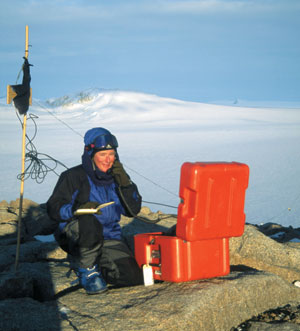




| Christine Siddoway | |
| By Peter Rice ’05 |
Wanted: Geology Students for Antarctic
Christine Siddoway likes hot coffee and cold working conditions. That’s convenient, because her job as a CC geology professor has taken her (and some lucky students) to Antarctica... seven times. Trip number eight is slated for November.
 |
| Photo by Louis Sass '00 |
Q: What’s the bottom of the world like?
A: Once we’ve acclimated to the temperatures (where I work, daytime temps are in the 20s °F), life reduces to the essence: Obtain water for drinking and cooking by melting snow. Dress in layers to prepare for changing conditions. Drive snowmobiles to the rock outcrop. Observe, describe, sample, interpret. Drive back to camp. Prepare food. Eat. Melt more snow. Sleep. Repeat.
Q: So good coffee is essential in those conditions?
A: Yes, but we have to do without some of life’s luxuries in the “deep field.” So in Antarctica I drink tea, and I savor the anticipation of a truly fine espresso back in New Zealand, after the field work is done.
Q: How do students hold up in those conditions?
A: Just great. Many CC students have the outdoor experience necessary and probably all have the intellectual intensity — due to the Block Plan — to be able to work under tough physical conditions for a long period (eight to 10 weeks) in the field.
Q: What does it take for a student to be part of the Antarctic team?
A: What I look for is a good attitude about shoveling snow. Digging out after a multi-day storm takes concerted effort from everybody. Louis Sass ’00 was very adept at igloo construction; he built us a comfortable, wind-tight outhouse. Seth Cowdery ’01 used his field research not only for his senior thesis, but also a master’s degree from the University of Washington. Anne Whitehead ’99 has such a good eye: for delicate rock textures, for the consistency of sound ice, for a wrong knot in an anchor rope.
Q: What interests you about geology?
A: Geology offers a context for understanding the contemporary world from physical, historical, and cultural standpoints. The geological landscape influences the pattern of human migrations, provides the setting for intensive agriculture, yields materials that allow dramatic technological advances... the list could go on. Many human creation stories make direct reference to geological features and/or catastrophes induced by a geological event.
Q: If the Bulletin gave you a plane ticket to anywhere in the world, where would you go?
A: During graduate school, I got acquainted with the unique tectonic setting of Easter Island and its cultural history, especially the Moai statues and human-induced environmental change. Rapanui (Easter Island) is the place I’d like to go.
The Colorado College | 14 East Cache La Poudre Street | Colo Sprgs, CO | 80903 || 719-389-6000